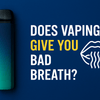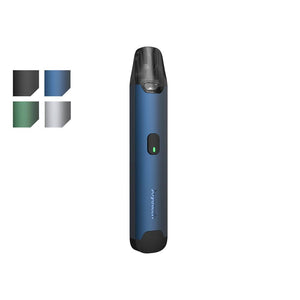Why Does Vaping Make Me Feel Sick | Health Effects

Why Does Vaping Make Me Feel Sick | Health Effects
Vaping was seen as a healthier option than smoking. But since August 2019, it has been linked to severe lung problems. The Centers for Disease Control and Prevention (CDC) has been tracking this issue.
This condition, called e-cigarette or vaping product use-associated lung injury (EVALI), has caused many hospitalisations and deaths in the UK. Symptoms include breathing troubles and digestive issues. The exact cause is still being looked into, but it's thought to be linked to lung inflammation from vaping aerosols.
Key Takeaways
- The CDC began tracking cases of severe lung problems related to vaping in August 2019, with thousands of individuals requiring hospital treatment and several deaths reported.
- The average age of individuals affected by EVALI is 24, with nearly 4 out of 5 being younger than 35.
- Vitamin E acetate, typically used to thicken liquids in e-cigarette products containing THC, has been identified as a common chemical found in the lungs of sick individuals.
- A majority of individuals who experienced EVALI had vaped THC, although there were reports of individuals who solely vaped nicotine.
- The vaping industry is described as "basically unregulated," lacking set standards for manufacturers to follow, leading to uncertainty for consumers regarding the products they are using.
Understanding Vaping: What Is It?
Vaping has become very popular in the UK over the last ten years. It involves breathing in and out vapour, unlike smoking which burns tobacco. Vaping devices heat up a liquid called e-liquid until it turns into vapour. This liquid usually has flavourings, additives, and sometimes nicotine or THC in an oily base.
The Rise of Vaping in the UK
In 2022, about 3.6 million adults in the UK used e-cigarettes. More people are vaping because they think it's safer than smoking. They also like the variety of flavours available.
How Vaping Differs from Smoking
Vaping and smoking are different because of how nicotine is delivered. Cigarettes burn tobacco, releasing harmful toxins. Vaping devices, however, heat e-liquids to create vapour. This is seen as less harmful, but the long-term effects are still being studied.
Common Ingredients in E-Liquids
E-liquids have propylene glycol, vegetable glycerin, nicotine, and flavourings. Vitamin E acetate, used to thicken, can cause lung damage if inhaled. It's important for vapers to know about the e-cigarette health risks and e-liquid ingredients they use.
The Science Behind Vaping
Vaping has become more popular, but it raises health concerns. Scientists are studying how vaping affects our bodies. It's important to know how it works.
How Vaping Affects the Body
When you vape, you breathe in a mix of chemicals. These can include propylene glycol, glycerin, and flavourings. They can harm the lungs and cause long-term damage.
Vaping also introduces harmful substances like formaldehyde and acrolein. These are made when the e-liquid heats up. They can increase the risk of lung disease and heart problems.
The Role of Nicotine in Vaping
Nicotine is a key part of e-liquids. It's highly addictive and can harm the body. It affects the brain, blood pressure, and artery health. Stopping nicotine use can cause nausea, vomiting, dizziness, and headaches.
Nicotine levels in e-cigarettes vary a lot. Many users, especially young people, don't know how much nicotine they're getting. This lack of knowledge increases vaping risks and the chance of nicotine addiction.
"Vaping can expose individuals to over 200 chemicals contained in the aerosol."
Research on vaping's long-term health effects is ongoing. But, it's clear vaping can harm the body. Knowing how it works helps us make better choices about vaping.
Common Symptoms of Vaping-Related Illness
Vaping has become more popular, but it's linked to health problems. People who vape might feel sick, including nausea, vomiting, dizziness, and throat irritation. These issues can really affect someone's health and make them question the safety of vaping.
Nausea and Vomiting
Nausea is a common problem for vapers. It can make them feel sick and even throw up. This can mess up their daily life. The chemicals in e-liquids might cause this feeling.
Dizziness and Lightheadedness
Vaping can also make people feel dizzy or lightheaded. This feeling of being off-balance can be scary and even dangerous. Nicotine in e-cigarettes might be to blame, as it affects the heart and brain.
Throat Irritation
Throat irritation is another issue for vapers. The vapour from e-cigarettes can be harsh, causing throat pain. This can lead to coughing, discomfort, and a sore throat, making vaping uncomfortable.
The severity and how long these symptoms last can vary. Some people might only feel mild symptoms for a short time. But others might have more serious and lasting problems. These symptoms show that vaping might not be as safe as thought.
"As of December 2019, there have been 31 confirmed cases of vaping-related lung illness at University of Utah Health."
Factors That Contribute to Sickness from Vaping
Vaping is getting more popular, and it's important to know why it can make people sick. How often and how much you vape, the quality of your e-cigarette, and your health can all affect the risks. These factors are key to understanding the dangers of vaping.
Quantity and Frequency of Use
How much and how often you vape can lead to sickness. Heavy users face a higher risk of health problems. The more you vape, the more harmful chemicals you might inhale, and it can harm your lungs.
Poor-Quality Products and Their Risks
The quality of your e-cigarette matters a lot for your health. Cheap or untested products, especially those with vitamin E acetate, are risky. They can contain harmful chemicals and increase your chance of getting sick or facing serious health issues.
Individual Health Conditions
People with health problems are more likely to get sick from vaping. This includes those with lung, heart, or immune system issues. Also, the average age of those with EVALI is 24, with nearly 80% under 35. Young people are especially at risk.
Knowing these factors helps reduce vaping risks. Being careful about how much and what you vape, and considering your health, can help avoid sickness. It's all about making safer choices.
The Impact of Nicotine on Your Body
Nicotine, found in e-liquids, affects the body in both short and long terms. It's key for vapers to know these impacts to protect their health.
Short-Term Effects of Nicotine
Nicotine from vaping can cause quick changes in the body. These include a higher heart rate, higher blood pressure, and feeling more awake. But, these effects don't last long and can lead to withdrawal symptoms.
Long-Term Health Implications
Long-term vaping can have serious health effects. Nicotine can lead to addiction and heart problems. It also worries experts about its effects on young brains.
"Nicotine can cause various effects on the body such as decreased appetite, heightened mood, increased heart rate, and blood pressure, nausea, headache, diarrhea, improved memory, increased alertness, and dizziness."
Stopping vaping is hard because nicotine is addictive. Symptoms like irritability, anxiety, and trouble focusing make quitting tough.
Vapers need to know how nicotine affects them. This knowledge helps them make better choices and find help for health issues.
Allergies and Sensitivities to E-Liquid Ingredients
Vaping is seen as a healthier option than smoking. Yet, some people might feel sick or dizzy. This could be due to allergies or sensitivities to e-liquid ingredients.
Common Allergens in E-Liquids
E-liquids mainly contain propylene glycol (PG) and vegetable glycerin (VG). These can cause allergies in some. Flavourings and nicotine also might trigger allergic reactions. Symptoms include throat irritation, coughing, wheezing, and shortness of breath.
Identifying Dizziness and Nausea Triggers
- People with conditions like hay fever, asthma, or eczema might react more to vaping.
- Propylene glycol can sometimes cause throat irritation and coughing, leading to dizziness or nausea.
- High nicotine levels in vape juice can also irritate the throat and cause coughing, leading to these symptoms.
Finding out what causes dizziness and nausea can be hard. E-liquids come in many different types. If symptoms don't go away, it's best to talk to a doctor. They might suggest trying different e-liquids.
| Ingredient | Potential Allergens | Symptoms |
|---|---|---|
| Propylene Glycol (PG) | Throat irritation, coughing | Dizziness, nausea |
| Vegetable Glycerin (VG) | Respiratory issues | Shortness of breath, wheezing |
| Flavourings | Allergic reactions | Throat irritation, coughing |
| Nicotine | Throat irritation | Coughing, nausea |
Knowing about potential allergens in e-liquids helps users choose better. This way, they can find a vaping experience that's right for them and their health.
Dehydration and its Connection to Vaping
Vaping is getting more popular, especially among the young. But it comes with health risks, including dehydration. The main parts of e-liquids, propylene glycol and vegetable glycerin, can pull moisture from the body. This leads to dehydration.
How Vaping Leads to Dehydration
Propylene glycol and vegetable glycerin in e-liquids draw moisture from the mouth and throat. This can cause dry mouth and make you thirsty. Vaping also makes you lose water when you breathe out.
Signs of Dehydration to Watch For
- Dry mouth
- Increased thirst
- Fatigue
- Headaches
- Dark-coloured urine
It's important for vapers to drink enough water. Dehydration can make other vaping side effects worse, like nausea and dizziness. Knowing the signs and drinking plenty of water can help avoid these problems.
"Dehydration is a common side effect of vaping, as the main ingredients in e-liquids can draw moisture from the body. Staying hydrated is essential for vapers to maintain their overall health and well-being."
The Role of Propylene Glycol and Vegetable Glycerin
E-liquids are key in vaping and usually have propylene glycol (PG) and vegetable glycerin (VG) in them. These ingredients are important for the vaping experience. But, they have raised health concerns for many.
Health Effects of Propylene Glycol
Propylene glycol is often found in e-liquids and can cause health problems. It can lead to lung inflammation and throat irritation. Some users also experience allergic reactions and discomfort.
Understanding Vegetable Glycerin's Impact
Vegetable glycerin (VG) is seen as safer than PG. Yet, it can cause dehydration because it takes moisture from the body. When heated and inhaled, both PG and VG might produce harmful substances. The long-term effects are still unknown.
More research is needed to understand PG and VG ratios, flavourings, and vaping's long-term health effects. Even though they are safe for eating, vaping's safety is still debated.
| Propylene Glycol (PG) | Vegetable Glycerin (VG) |
|---|---|
|
|
"Future studies should explore the effects of varying ratios of propylene glycol and vegetable glycerine, the impact of flavours, and randomization of smokers to e-cigarettes for longer durations to gain a more comprehensive understanding of the health effects."
Mental Health and Vaping
Vaping is becoming a big worry for public health. It's linked to bad mental health effects. Nicotine in e-cigarettes can make people feel anxious and stressed, especially when they stop using it.
Anxiety and Stress Induced by Vaping
Vaping can lead to mood swings, irritability, and trouble focusing. This is because nicotine is addictive. It's hard for people to stop vaping, even if they want to.
Young people are especially affected. Their brains are still growing, making them more vulnerable to nicotine's effects.
The Psychological Effects of Nicotine Withdrawal
Trying to quit vaping or cut down on nicotine can be tough. People may feel anxious, depressed, restless, and have trouble sleeping. These feelings can make it hard to stop vaping.
Studies show vaping has serious mental health risks. People who vape now are more likely to feel depressed than those who don't vape. Those who vape a lot are even more at risk.
It's important to talk about vaping's mental health effects. We need to help people understand the risks. We should also offer support for those trying to quit vaping.
Poor Vaping Practices
Vaping might seem safer than smoking, but bad vaping habits can increase health risks. Using vaping devices poorly and not keeping them clean can release harmful substances. This can be dangerous for your health.
Suboptimal Device Use and Maintenance
Using vaping devices the wrong way can be very harmful. Using the wrong batteries, not cleaning the device, and ignoring maintenance can lead to toxic releases. It's important to use safe vaping practices and high-quality products to avoid e-cigarette health risks.
Understanding Temperature Regulation in Vaping
The temperature of e-liquids when vaporised is key to avoiding harmful substances. If the temperature gets too high, it can create toxic compounds like formaldehyde and acrolein. Keeping the temperature right is crucial for safe vaping practices and reducing e-cigarette health risks.
"Vaping can be a useful tool to help smokers quit, but it's crucial that users understand the importance of proper device maintenance and temperature control to ensure their safety."
Learning how to use and maintain vaping devices properly is important. Knowing about temperature control can help vapers reduce health risks. This way, they can look after their health and well-being.
Is Vaping Safer than Smoking?
The debate on e-cigarettes' safety versus traditional cigarettes is growing. Vaping is seen as safer, but its long-term health effects are still unknown. It's important to compare vaping and smoking risks to make smart health choices.
Evaluating the Risks
Vaping has fewer toxic chemicals than smoking, but it still poses health risks. In the last 24 to 36 months, vaping-related cases have skyrocketed, says Johns Hopkins lung cancer surgeon Stephen Broderick. Traditional cigarettes have around 7,000 chemicals, while vaping's effects are still a mystery.
E-liquids contain harmful ingredients like diacetyl and vitamin E. Diacetyl can damage lung passageways, and vitamin E is an irritant when inhaled. Conditions like Primary Spontaneous Pneumothorax and popcorn lung are linked to both smoking and vaping.
Comparative Health Outcomes
The link between vaping and lung cancer is unclear, but the risks are real. Secondhand vapor from e-cigarettes is harmful, containing substances like nicotine and benzene. These pose risks to those around vapers.
In the UK, experts found vaping is safer than smoking in the short and medium term. Nicotine vaping is also more effective in helping people quit smoking than other methods.
More research is needed to understand vaping and smoking risks. People should talk to healthcare professionals before making health choices.
Seeking Help for Vaping-Related Illness
If you're feeling sick after vaping, it's key to see a doctor. Look out for signs like a long cough, trouble breathing, chest pain, nausea, or fever. Doctors might do tests like chest X-rays to check for lung damage.
Treatment for vaping sickness depends on how bad it is. For mild cases, doctors might give corticosteroids to reduce swelling. But for serious cases, you might need help breathing with a ventilator.
When to Consult a Healthcare Professional
Get medical help if vaping symptoms don't go away. Signs that mean you should see a doctor include:
- A cough that lasts
- Hard time breathing
- Pain or tightness in your chest
- Nausea, vomiting, or diarrhoea
- Fever or losing weight without trying
Resources for Support and Guidance
In the UK, there's help to quit vaping. The National Health Service (NHS) has stop smoking services. They offer nicotine replacement and support to quit. There are also online groups where you can find support.
Looking after your health and getting help is important. By addressing vaping concerns early, you can protect your health. It's a step towards a healthier life.
Conclusion: Making Informed Choices about Vaping
Understanding vaping's health risks is key to making smart choices. While vaping might be safer than smoking, it still carries risks. It's important to weigh your own health risks and know the signs of vaping-related illnesses.
Assessing Personal Health Risks
When looking at e-cigarette health risks, think about your own situation. Your age, gender, and health can affect how vaping impacts you. Research shows that young people, especially boys, face bigger risks from vaping.
The Importance of Educating Yourself on Vaping
Learning about safe vaping and quitting options is vital. Knowing the risks, like dehydration or nicotine's effect on mental health, helps you make better choices. Keeping up with new research in vaping is also important.
FAQ
Why does vaping make me feel sick?
Vaping can make you feel sick because of the chemicals in e-liquids. These include propylene glycol, vegetable glycerin, and flavorings. The amount and frequency of vaping, as well as the product quality, can also play a role.
What are the side effects of vaping?
Vaping can harm your health in many ways. It can damage your lungs and heart. It can also cause serious lung injury, known as EVALI. Common side effects include nausea, vomiting, and throat irritation.
Nicotine addiction and withdrawal symptoms are common too.
What are the symptoms of nicotine withdrawal from vaping?
Quitting vaping can lead to nicotine withdrawal. Symptoms include anxiety, irritability, and mood swings. You might also find it hard to concentrate and feel strong cravings for nicotine.
What are the health risks of e-cigarettes?
E-cigarettes pose serious health risks. They can damage your lungs and heart. Inhaling e-cigarette aerosols can cause inflammation and lung damage.
The chemicals in e-liquids, like propylene glycol and flavorings, can be harmful when heated and inhaled.
Why do I feel nauseous from vaping?
Vaping can make you feel nauseous. The e-liquid aerosols can irritate your throat and digestive system. Nicotine in e-liquids can also cause nausea, especially for new or occasional vapers.
Dehydration from vaping can make nausea worse for some people.
Why do I get headaches from vaping?
Headaches are a common side effect of vaping. The e-liquid aerosols can cause inflammation and irritation. This can lead to headaches.
Nicotine withdrawal, dehydration, and the release of chemicals during vaping can also cause headaches.
Why do I feel dizzy from vaping?
Dizziness is a side effect of vaping. The e-liquid aerosols can cause a drop in blood pressure. This can make you feel lightheaded or dizzy.
Nicotine in e-liquids can also affect blood pressure and circulation. Dehydration from vaping can also contribute to dizziness.
Does vaping cause dehydration?
Yes, vaping can cause dehydration. The primary components in e-liquids, propylene glycol and vegetable glycerin, absorb moisture. This can lead to dehydration symptoms like dry mouth and dark-coloured urine.
What are the ingredients in e-liquids?
E-liquids contain propylene glycol, vegetable glycerin, nicotine, and flavorings. Propylene glycol and vegetable glycerin are the base components. Nicotine and flavorings are added for their effects. Some e-liquids may also contain vitamin E acetate, which can harm lungs when inhaled.
How can I vape safely?
To vape safely, use high-quality, regulated products. Keep your vaping device clean and avoid excessive use. Use the right battery and temperature settings to prevent harmful byproducts.
Regularly clean your device and replace worn-out parts to reduce exposure to toxic substances.






